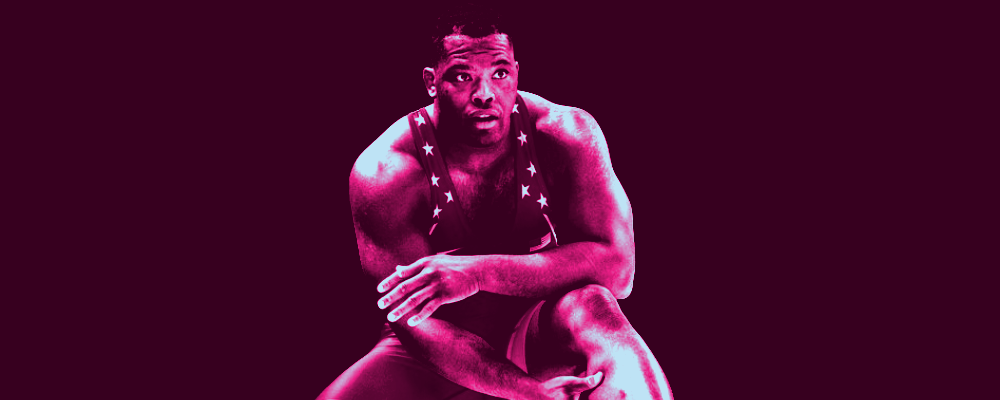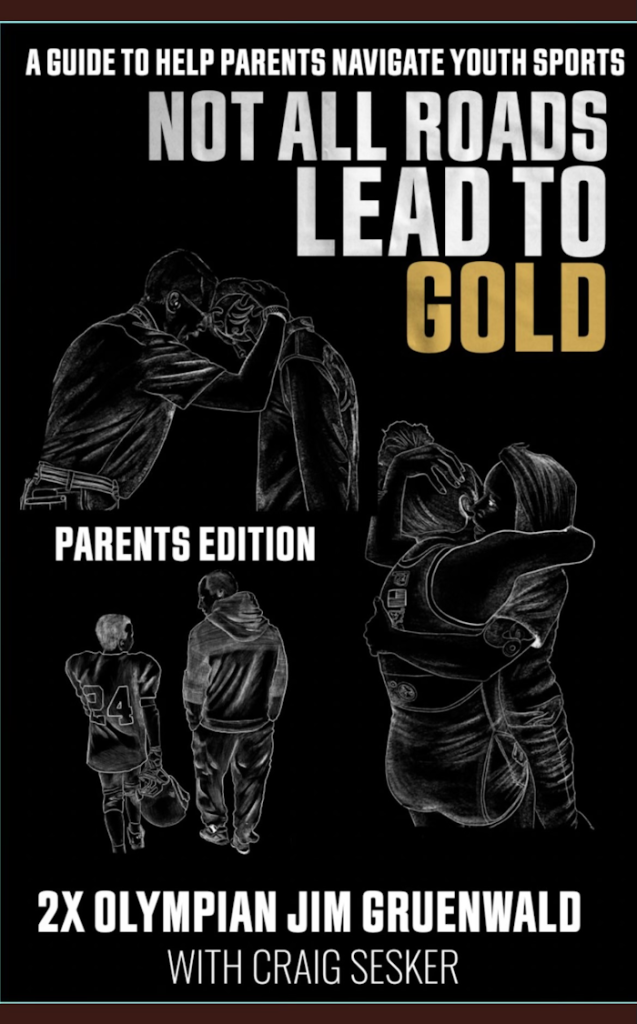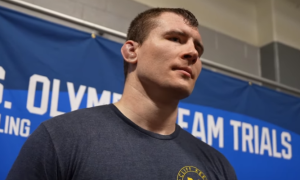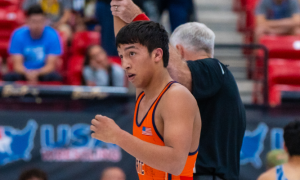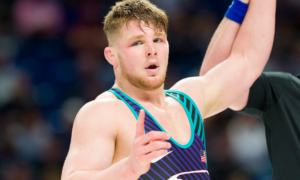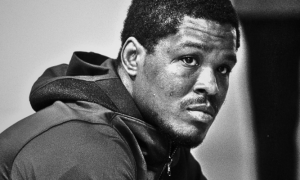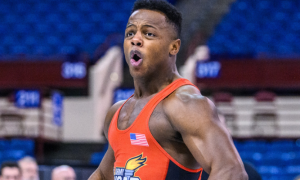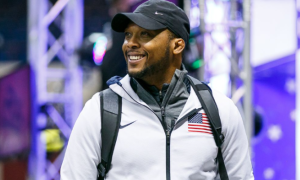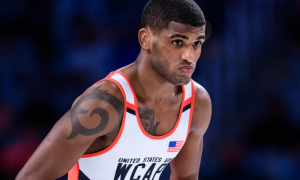A quad ago, but not quite. Courtney Freeman (130 kg, Marines), who prefers to be called by his middle name Denzel, made his Senior Greco-Roman debut in late March of 2021 at what is called the US Last Chance Olympic Team Trials Qualifier. Just as the title suggests, the event was, is, the final opportunity wrestlers have to gain entry into the Olympic Trials if they had been previously unable to do so. Freeman did not have such an opportunity. Mainly because he had never wrestled on this level ever before.
And he made the finals, did Freeman, eventually falling to Tommy Helton, who for his part had performed impressively throughout the day. Nevertheless, Freeman was hard to miss. It was clear that he had capabilities. He was strong, could move well, demonstrated sound instincts. No, he did not really know what he was doing out on the mat, but that’s fine. Newbies get graded on a curve.
He says now that he “fell in love” with the classical style. It was fresh for him. He was a Marine who had wrestled in college (NAIA runner-up for the University of the Cumberlands) and desired to continue in the sport. Freeman did not know that the All-Marine Team only competed in Greco but that hardly dissuaded him from giving it a whirl. And he was hooked. A common occurrence for many athletes after finally stumbling upon the discipline.
Freeman did not relent, even with the All-Marine Team ceasing as a full-time program at Camp Lejeune. He kept practicing, placed sixth in the Nationals one month later, and competed at another “Last Chance” tournament the proceeding July, this time for the World Team Trials. Again, he had his moments but came in second.
Freeman was also busy with embarking on a career in mixed-martial arts yet he remained committed to Greco. His progression in that first full year was, unsurprisingly, rapid. At the April US Open in ’22, Freeman advanced all the way to the semifinal and eventually finished fourth. One more medal arrived later that year when Freeman earned bronze at the Bill Farrell Memorial in New York City.
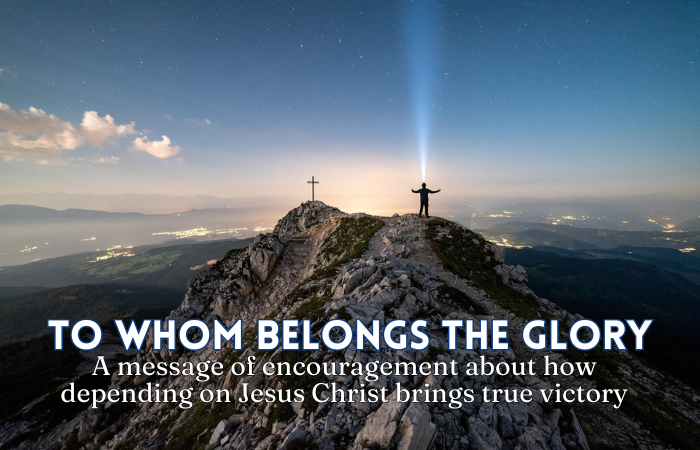
Convinced of his promise as a Senior competitor, and with his time as an active Marine drawing to a close, Freeman next moved to Colorado Springs in order to further hone his skills at the US Olympic and Paralympic Training Center. A serious decision for a man who is just past 30 years of age, and one who could have easily invested all of his efforts into prizefighting, where the spotlight is a little brighter and comes attached to, perhaps, more consistent financial gain. But, no. Freeman not only chose Greco, he took the most professional, and logical, route plausible to expedite his progression.
Setbacks can be important, too, however, and Freeman endured one in his first tournament as an OTC resident athlete. The anticipation was that he would at the very least garner a high-enough placing at the ’23 US Open to qualify for the World Team Trials. Seemed like a shoo-in, considering his rate of improvement, previous results, and the fact that he was also coming off of a dominant performance at the Armed Forces Championships. Instead, he found himself flat-footed from a tactical perspective and surrendering positions and points in the most inopportune moments throughout his time in Vegas. Freeman finished outside of the margin required for earning a spot in the Trials and his domestic season was over before it had really ever begun.
Whether or not Freeman needed to reconcile the feelings associated with having a “down” tournament is debatable. While confident in his wares as a competitor, he was grounded in the understanding that he had to play catch-up with those who have been on the circuit longer. Plus, there remained solid reasons, if not verifiable proof, that he was on the right track despite coming up short at the Open. To overvalue the outcome from a single performance, or over-analyze the result only to ask questions of himself that really did not deserve answers, would have been counterproductive. Rather, he simply sought input from those in and around his eco-system, re-examined his matches and noted miscues, and went back to work.
He didn’t stay dormant very long. In June, he made his second appearance for mainstream MMA promotion PFL (Professional Fighters League; in his first fight for the organization, Freeman won via head kick knockout and received massive attention on social media following the blast, along with scoring a contract). There were other avenues to explore, as well. He knew that wrestling, the Olympic Year, all that noise, still stood as the primary objective, and so he weighed his options. One such idea cascaded into his purview shortly thereafter: to head overseas and compete.
In his first foray on foreign soil, Freeman won the Grand Prix of Spain. Though not the most crowded tournament on the summer schedule, the Spanish GP allowed him to gather a deeper sense of the international landscape and log that experiential knowledge for later use. A medal of any color would have sufficed, but that Freeman walked away with gold certainly did not go unnoticed. After a brief pause, he was back overseas for the Grand Prix of Germany in tow with World Team member Ildar Hafizov (60 kg, Army/WCAP). A first-round defeat (to Ukrainian Mykhailo Vyshnyvetskyi) meant an early exit from the event. But — a dichotomous proposition. Fans and observers tend to spy such a result and label it as a negative. Freeman insists that it was the opposite. For it was at the Grand Prix of Germany where he realized, definitively, that the formidability of the big bad foreigners was more of a mental construct than a realistic one. They were humans, too, and just as beatable as anyone else, provided he kept doing his part in the practice room.
And now you look.
Once the Olympic Year got underway in the fall, Freeman showed himself prepared to express his growing skill-set and offensive methods in every available competitive opportunity. The initial charge was witnessed at the Farrell in November. Freeman rocketed to the finals, and by doing so qualified for the Olympic Trials. The December Nationals, which at press time represents his most recent outing, saw Freeman go on another scoring blitz and make an impact. Technically, he had made the National final. The format of the tournament in his weight category was such that those who prevailed in the semifinal (Freeman in conjunction with ’18 World silver Adam Coon) were called upon to meet in a wrestle-off to determine which of the two would face reigning multi-time World rep Cohlton Schultz (Sunkist). Coon won the match, but Freeman also had his moments and both athletes lit up the scoreboard in a manner that is altogether unusual in the heavyweight division.
Because of this, and all of the above, Freeman is, at minimum, a sleeper candidate heading into the Olympic Trials. Every other major player in the bracket recognizes the threats that he can pose, and the rate of improvement that has accompanied Freeman’s time in this grandest of Olympic sports similarly cannot be ignored. It has all coalesced quickly, an equation that includes his introductory excursions and encouraging results, in addition to the setback he encountered in April and the surge it has led to this season. No matter how you digest Freeman’s status as an Olympic Team contender, the speed in which it has come to fruition is part of the picture.
It just began a quad ago, but not quite.
5PM Interview with Courtney Freeman
5PM: Why did you pivot to Greco-Roman wrestling when you did, and how you did, back in 2021?
Courtney Freeman: Basically, that was the Marine Corps days. When I went into the Marine Corps, I always had the intention of wrestling, but I was unaware that they only did Greco. I figured, I’ll give it a try. And then I fell in love with it.
5PM: You had your own wrestling base prior to Greco. How have you translated your previous wrestling experience to this style?
CF: The only thing that I would say that I’ve kept from my previous wrestling background is that I knew that I was fast. When I first began learning Greco, I was doing a lot of duck-unders and stuff. That was basically the only thing I brought directly from my folkstyle career to Greco. I was also doing a lot of martial arts for my fighting. I also had a tryout with WWE (World Wrestling Entertainment) right after college. The thing that helped me the most is that they all helped me to slow down when I was trying to learn so that I could understand what I was doing. That is pretty much what helped me with learning Greco, to not go too fast. To not rush things.
5PM: What do you remember when looking back at your first Senior tournament, which was the ’21 Last Chance Olympic Trials Qualifier? How much time on target did you have prior to that?
CF: I really don’t remember how much time I had before that. I do know that afterwards I felt good. I was like, I feel great. Now when I look back at it — if I watch the videos — I was looking horrendous. Just compared to where I am now, it was very different. I don’t know how I did that well. I surprised myself. When I look back at it then and watch it now, I still surprise myself.
5PM: The curtain was dropping on the Marine program just as you were beginning in this sport. Before that happened, did head coach Jason Loukides have any influence on you? Or perhaps any of the other Marine athletes?
CF: There was one guy, Trent Osnes. Rightfully so, the coach (Loukides) was focused on the other wrestlers at that time. The ones who were actually good. So, I spent most of that time working with then-Captain and now-Major (Dan) Miller. He was the one who was helping me because I only had one training partner, which was Austin Craig. Major Miller was the one who was helping us get better because we didn’t know what we were doing. I would say Major Miller and Trent Osnes.
5PM: You have an MMA career, and recently you did a grappling match, as well.
CF: I did.
5PM: How do you manage having an MMA career with aspirations to make the Olympic Team?
Courtney Freeman: It’s all about establishing priorities. It is about what takes priority, acknowledging that, and explaining it to your coaches so that they are on the same page as you. Right now, all of my coaches know that what takes priority is wrestling. Wrestling takes priority over everything. When I schedule fights, grappling matches, whenever I schedule anything, we always have to make sure that it doesn’t interfere with wrestling. And if something important comes up, then it is like, We may have to adjust a little bit for wrestling.
5PM: Is it more or less challenging for you since moving out to Colorado Springs last year?
CF: It is less challenging now. When I was active in the Marine Corps, if they told me that I had to do something, and I had something coming up — whether it was wrestling, fighting, or grappling, no matter what it was — I had to cancel it. And now it is not that way. It is less of me having to cancel it, and more that I can adjust. It is not really as serious as it used to be. I have more freedom now.
5PM: Your skill-set, ability, and results have drastically improved since going out to Springs. Who from the Greco program has been instrumental insofar as working with you, coaching you, and so forth?
CF: I’m going to say all of the coaches: Justin Ruiz, Ismael Borrero Molina, and Coach Cheney (Haight). Coach Cheney helps a lot. Coach Cheney helps a lot-a lot because I talk to him after almost every practice. We always talk about how practice went and what I can improve on. It is the same thing with Coach Ruiz, as well. Just those small things that we hit on make a difference everyday. Coach Borrero, too. Whenever I need help with details, I go to him.
As for athletes, I would say the best experience has been with Aden Attao. Right now, I’m ranked #3 and he is ranked #4. We’re always training together. There are some days when you don’t feel like going to practice. Some days, you just feel like staying home or skipping a practice. I know that Aden is going to be at practice — so I go. I have to go. Because, I know that Aden is going to be there and I can’t leave him hanging. And then because he is #4 and I’m #3, we definitely push each other. At the same time, I can’t let him advance too far without me advancing because that is going to most likely lead to him beating me at the Olympic Team Trials, which is something that we can’t let happen.
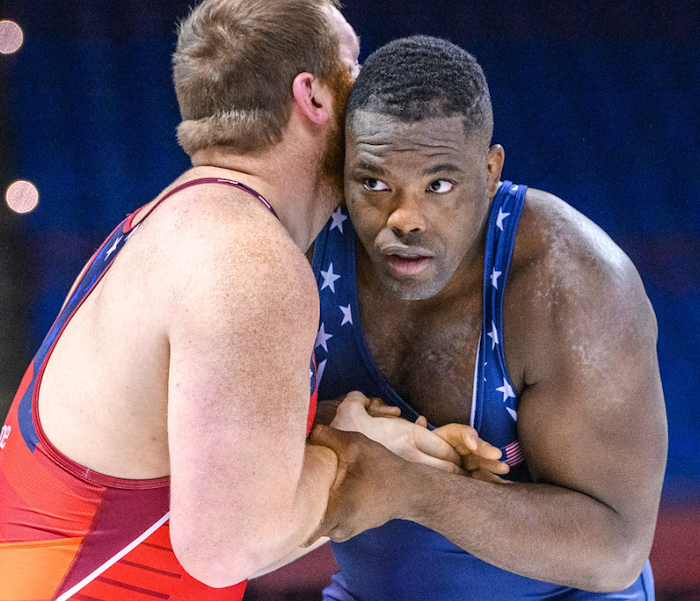
5PM: You went over to Spain for their Grand Prix, which actually had become a stop for the All-Marine Team in the past. You won that tournament. What did that do for your confidence and what was the experience like overall?
CF: The thing that I got from the Grand Prix of Spain was that it was my first international medal, and it was my first time hanging out in another country. It was my first overseas camp. It was Shaun Heist and I, so it was me and a buddy going to wrestle. And then after we wrestled, he left. Then it was just me and the women’s freestyle team in Spain. The reason why I’m not talking about what it did for me in wrestling is because what was more influential happened to be when I went to the Grand Prix of Germany the next month. I lost my first match and then my opponent lost his next match. But — that actually did more for my confidence than Spain because it was a tougher tournament, and it was where I realized that guys overseas were just regular guys. Whereas in the Grand Prix of Spain finals match, I just tried something lucky and it worked.
5PM: Are there any international heavyweights you like to watch in particular?
Courtney Freeman: Riza Kayaalp. Well, of course everyone likes to start off by watching (Mijain) Lopez. Everyone starts off and they try to watch Lopez but he is not as active as Kayaalp. The best thing about watching Kayaalp’s matches is that sometimes he loses, right? And then when he loses — and they are always close matches — it puts a spotlight on whoever beat him. When the win is by one point, you have to start looking at what small difference was made in how he lost. What I start thinking about is Riza Kayaalp’s match in the final versus Amin Mirzazadeh. He, Kayaalp, lost by just one thing. Mirzazadeh was able to get an underhook at the end and push him him out.
So to answer your question, it starts with Riza Kayaalp and then who he is going against.
5PM: When you say that who he goes against, do you mean different opponents in terms of skill? Or in terms of different body types?
CF: I started watching Riza Kayaalp because of his resume. Because of his World medals and European Championships medals. Then it branches off to other wrestlers. Because, my body type is different than some heavyweights. Sometimes I’ll watch a tournament with Riza Kayaalp and that finals match, then I’ll watch the 97 finals match, and the 87 final, the 82’s… Then I will find other wrestlers who I think I can take something from. When I start my studying, I start with Riza Kayaalp because of his accomplishments and then it branches off to different wrestlers. But it always starts with Riza Kayaalp.
5PM: Chronologically, you go overseas twice in the summer. The new season begins this fall and right away you wrestled impressively in New York to make that final and qualify for the Olympic Trials. At the Nationals a month later, you essentially make the challenge tournament final. The improvement in results is one thing, but your style and conviction to score are what really stand out. You’re scoring in ways most heavyweights in this country either cannot or do not bother to try. So what has been the switch that flipped leading to you surging as a contender for this Olympic Team?
Courtney Freeman: One of the coaches I forgot to mention is Dremiel Byers. I work with him a lot and he has a very unique way of teaching. That definitely has helped. When it comes to my matches, if he is not there then he is probably the first one to call me. The way that he goes about it is pretty different. I remember after the Nationals, after I wrestled (Adam) Coon, he asked me, “What was your plan going into the match?” It wasn’t, How do you feel about the match? It wasn’t, How do you think you need to feel? It was, “What was your plan going into the match?” He makes me focus on the advantages I have over heavyweights. We were working together before the 2023 Nationals in April and changing a lot of things. I always say that was the reason why I didn’t perform so well, because we had just started training together and he was showing me everything that I was doing wrong. I was in a transitional phase because we could see that I was working on all of the stuff that we had been focusing on, but none of it was perfect. Most things we were working on still had holes in them.
The most influential teammate I ever had was Jamel Johnson. Whenever Jamel tells me something, I try to listen. He used to tell me something that I never understood until the middle of last year. He used to tell me that I needed to be more aggressive. I didn’t understand what he meant by that.
So, during that tournament (’23 US Open), I tried to be more aggressive and in the first match it didn’t work, and I lost. I thought I lost because I was trying to be too aggressive but it was because I still didn’t know what I was doing. Then for the rest of the tournament, I didn’t know how I should be wrestling. I was just confused. It was a confusing transitional period. What helps me the most is going back and watching my matches. When I went back and watched my matches, I could clearly see that aggression wasn’t a problem. It was just that all of the things that I tried to do, all of the stuff me and Coach Byers were working on, still were not where they needed to be. I was still missing the aggression piece.
For the next few months, I still didn’t have it. Even though Jamel had given me those words of wisdom, I still didn’t understand it. Crazy enough, I didn’t understand the aggression piece until my fight for PFL in June and I lost by split decision. That means either of us could have won. Of course, people on my side said that I won the fight; but it doesn’t matter because when I go back and watch that fight, I can see that the other guy won. They (the judges) gave him the fight because he was being more aggressive. I was too comfortable backing up, getting my back against the cage. When I returned to MMA practice, we broke it down and one of the things we said that we were going to focus on is being more aggressive. Pushing the pace. Moving forward and not getting pushed back.
I related that to wrestling, as well. From a fighting standpoint, if your back is against the cage, then you can no longer move backwards. Your opponent can move back, left, right or forward — and you can only move left, right or forward. So, you have to do something. That also applies to Greco because when you’re in the caution zone, you cannot move back any more. We started going deeper and deeper into it. When your back is against the cage, or you are in the caution zone, now you have to do something and your opponent doesn’t. You are also more vulnerable to getting scored on because now he knows that you have to move, and he knows that he can relax. He can attack, and he is in less danger.
That fight in June opened my eyes and it started to put me into a focused period that is still ongoing, but it was soon after when I stopped hanging out with people. Especially with the people at the OTC (US Olympic & Paralympic Training Center) because sometimes we’d go to practice — and then soon as practice would end, we’d shower and go to the cafeteria for a few hours and enjoy everyone’s company. People were used to that. Then, and I forgot what the exact reason was, it came to a point when I had to label everyone, especially the girls, as a distraction. I had to start thinking, What are some things that I do that I can sacrifice in order to spend more time in the wrestling room? So instead of practicing, showering, and going to eat with everyone else, it was practice, stay after, and do something extra.
One of the influencers for that was Muminjon Abdullaev from Uzbekistan. We wrestled in New York in 2022 and he came to one of our camps. He showed me a lot of stuff at the camp. I remember one day, I told him that my arms get tired from pummeling. So he brings me over to the wall after practice and shows me some of the Suples bands. He was like, ‘Everyday after practice, do these bands and you won’t get tired.‘ That was the first habit of me doing something after practice, doing those band workouts with my arms. Then Coach Borrero has us do rope climbs, because he likes rope climbs. Coach Herb (House) then said, “I want you guys doing pull-ups after practice.” Then Coach Ruiz said, “I want you guys talking to coaches more.” Because, we don’t do technique at practice. We don’t circle up and it is, Okay guys, here is this move. No, we just drill. We drill and go live.
So in order to do all of that, I had to stop hanging out with people. It’s crazy, because when you focus like that, you start to notice the people who don’t focus like that, and it makes a difference in competition. The people who do stay after practice and work extra, it shows in their results. One guy, Duncan Nelson, he was injured for most of 2023 but he still came to every practice, stayed after, and he is one of the guys who is getting better.
Of course, it is hard to stay focused all of the time. Sometimes you need assistance or a teammate to help with your mindset. For me, that was Tim Young before he went to (Army) WCAP (World Class Athletes Program). Tim was in the same situation where he was hanging out with everyone and then he started to just worry about wrestling. It helped. Whenever he would become unfocused or I would be unfocused, we would just start talking about the things that we should be focused on. One guy would pull the other guy back. When you make that change to focus on wrestling, or focus on whatever it is, people can see that change. At first, some of the people, some of the girls, thought that something was wrong. Nothing was wrong. I was just trying to get my mind right.
When we talk about teammates, the person who I see the most is Aden. He can tell. If I tried to drill too aggressively, or if I started the move wrong, I would start over or take a break. I wouldn’t finish the move. I wouldn’t practice the bad rep. I would walk away and then come back. And he knew exactly what I was doing. He knew where my mind was but he didn’t say anything. It is a very long road. It’s something. It really is.
5PM: You have had a little gap here competitively since the National tournament. How are you dealing with that when it comes to the window before Trials? How are you filling that in competitively?
CF: That grappling match I did. I have all of these grappling matches that I do, plus my MMA practices. I feel like I keep busy. I was supposed to fight this month but the guy pulled out. Then I have my Marine stuff. So in my opinion, I’ve been pretty busy. For me, it doesn’t feel like a gap. It is just time to train so it doesn’t really bother me at all.
5PM: So in other words, you are able to gain a sense of competitive satisfaction by filling in this space before the Olympic Team Trials with your MMA career? You think that this helps keep your competitive mindset where you think it should be?
CF: Yes. With wrestling everyday as much as we do, everything else that we do serves as a break from wrestling. A good mental break. I do about two MMA practices a week. I just started working out with the boxing team. It’s a different page, a different feel. It helps me stay focused. I like that I have this focused mindset but, sometimes, I can’t get rid of it. I’ll come home still thinking about wrestling and my body is still warmed up. I’m still breathing hard, still hot, still ready to go, and I can’t shake it. It is because I like wrestling so much. When I do these other sports, it’s relaxing. And since I don’t hang out with people, I can’t depend on people to calm me down. These other competitions create balance for me.
5PM: How do you go about paying attention to your body when it comes to proper rest? Do you do that instinctively, innately? Or is it according to a schedule?
CF: For resting, I would say that I try to rest when I can. This is a hard question because resting is one of my issues. It really is. I guess I’ll start with sleep. With sleep, I try to make sure that I get my eight hours a day. Like, easy. What I’m not too good at is waking up early enough before practice so that I can eat breakfast. Eating breakfast is something that I should do that I don’t do and have an issue with. When it comes to recovery, I prefer not to do things like the ice bath because I hate the cold. I just hate the cold.
Sometimes, I try not to do too much extra because I’m light for heavyweight, unfortunately. I try not to go crazy because I don’t want to lose too much weight. I try to eat extra, but sometimes that does not happen. Maybe recovery is my weakest area because I like to work. Even when we do camps, we take out the lifting that we usually do so that we can wrestle more, and I’ll get a third workout in and lift. Or I will go get some cardio in with our strength and conditioning coach. If I get too tired off of that, then maybe I won’t do three or four workouts the next day. But recovery is probably my weakest point.
5PM: You have just about two months before the Olympic Trials. What are your plans for this homestretch preparing for the tournament?
Courtney Freeman: My plan is to keep doing what I’m doing because that is what seems to work. The most important piece to my training right now is Aden Attao. We push each other everyday and we definitely see our progress. So, keep doing what I’m doing. Keep using my coaches and keep using Aden to push myself on the days that I don’t feel like being there.

Listen to “5PM57: Kamal Bey and David Stepanyan” on Spreaker.
Listen to “5PM56: Rich Carlson and Spencer Woods” on Spreaker.
SUBSCRIBE TO THE FIVE POINT MOVE PODCAST
iTunes | Stitcher | Spreaker | Google Play Music

Notice: Trying to get property 'term_id' of non-object in /home/fivepointwp/webapps/fivepointwp/wp-content/themes/flex-mag/functions.php on line 999

